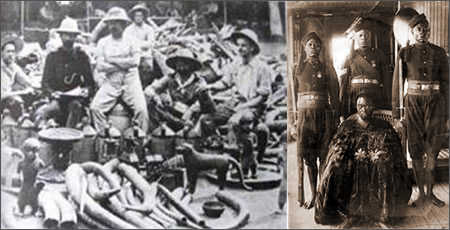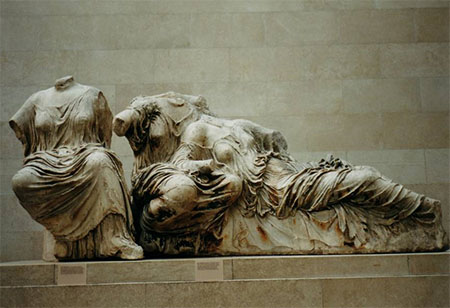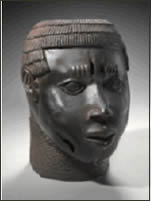After the publication of my article entitled “Looted /stolen cultural articles declared shared heritage” (2) a friend sent me from Germany a magazine with the title, “Ein Berliner Schloss fur die Welt”, (A Berlin Palace for the World), issued by the Humboldt-Forum. (3) Apart from the very misleading title, creating the impression that the future museum had been built specifically for the world and not for Germany, as evident from all available information. The publication follows the style of the British Museum which argues that the British Museum is not a British museum but a museum for the world. (4) The magazine contains many tendentious statements and articles that assume, apparently, that the German public cannot distinguish between facts and fiction.
Under the heading, Humboldt Lab Dahlem, we are informed that the African and Asian artefacts in the museums in Dahlem (a suburb of Berlin) will not only travel to the middle of the city to the Humboldt-Forum but will also be transformed in the process (“sie verwandeln sich dabei auch”) for the narratives concerning them will be different. How are the objects when they arrive in the museum (and why not other objects?) How has the viewing perspective on these objects changed and what do they still have to tell us? After these questions the author declares:
“Objects have no meaning in themselves. They always play another role-for human beings. And whoever begins to think over this changing process, will not be able to finish with the questions posed thereby”. (5)
What the author is telling us is that objects such as the African sculptures in the Ethnologisches Museum have no fixed meaning since meaning or importance depends on their location and viewer. The Benin cultural artefacts, for example, would be transformed in the process of their transfer from Dahlem to Berlin Mitte, a journey of a few kilometres. What an extraordinary statement. Most of us will agree that the symbolism and the meaning attached to a particular object may differ from society to society and that what may be seen as a sign of good luck in one culture may not have the same significance in another context. In other words, the function and meaning of an object may vary from culture to culture. To extend this fact to imply the transformation of objects from a short journey in Berlin, within the same city, is a view that cannot be easily accepted without further evidence.
Do the Benin artefacts cease to possess the meaning and importance they had in Benin through the travel to the Humboldt-Forum via London and Dahlem? This seems to be a very easy transformation. Did this also occur when the objects were transported from Africa to Europe? If so, why do museums still attach African labels to these objects and assign their origins to Africa?
The author may be reflecting here the spurious theory of shifting values that the organizers of the 2007 exhibition, Benin: Kings and Rituals-Court Arts from Nigeria (6) tried to advance as justification for holding on to the looted Benin Bronzes. The argument, put simply, is that by being in Europe, those artefacts had gained additional values and had changed their significance. Whilst in their original context, the Benin objects expressed values determined by religious belief and dynastic interests, through their enforced sojourn in the West, they had acquired new values based on the "technical brilliance, formal elegance and iconographic complexity of their execution." This shift in attribution of values should at present be seen within the "competing contexts and claims of local tradition, the nation state, and globalization". (7) This self- serving theory has not been mentioned for a long while since the 2007 exhibition and one is surprised that it is now being revived, however indirectly. (8)
Even if artefacts were to change their nature and function and to be transformed during their journeys, this self-serving theory does not sit well with most of us when a holder of looted artefact asserts that the object that was looted is not the same as what he is now holding. Imagine the result that would flow from accepting such an unfounded theory. All that would be needed would be to proclaim that the objects have changed their nature and therefore the deprived owners have no case. Is this seriously meant by our colleagues at the Humboldt-Forum? Someone must inform our German colleagues that the requests for restitution of cultural artefacts is not about their display, exhibition or interpretation. These demands are linked with questions of location, possession, ownership and above all, cultural identity. Are the Benin artefacts German or constitutive elements of Nigerian cultural identity?
More surprising statements are to be found in the section entitled “Der Afrika-Flügel”, (The African Section) where an attempt is made to explain what will be found and done in the African Section of the museum and related issues, in a form of discussion between Paola Ivanov, Italian Ethnologist and a US-American, Jonathan Fine, who are curators of the African Section. The discussion is in the form of question and answer. The questions were presumably set by the authors who provided the answers themselves. In response to the question how do you generally treat colonialism, the authors answer, inter alia, as follows:
“Colonialism will be a theme in each module. We do not want to hide anything
or minimize anything. Take Benin for example. All the very precious bronzes,
very beautiful bronzes came to Europe as a result of the destruction of the
Benin capital by British troops. How the bronzes then landed in Berlin- this will
be discussed in the exhibition curated by Peter Junge”. (9)
This is a very curious answer. The authors are willing to explain how the Benin Bronzes came to Europe and, correctly explain it was the result of the British invasion of Benin. But how these looted precious objects came specifically to Berlin and Germany is to be explained in another exhibition by another curator. Why can the authors not explain in a few words that the Germans bought the looted objects, a few months after the invasion in 1874, some of the objects presumably still with Benin blood stains on them? Should the public not know that the Germans were fully aware that the Benin Bronzes were looted objects and indeed, the auctioneers were proud to inform potential buyers that these were fresh goods? The complicity of the Germans in this matter, as accomplices after the fact, may have embarrassed the writers. The German public is presumably more interested to know how the Benin bronzes came to Germany and Berlin, where there is now said to be a Berliner Schloss fur die Welt, than in the British invasion. Were the authors trying to avoid the obvious questions that spring to the mind on seeing a cultural artefact, “where did it come from and how did it get here?”
The next heading reads as follows: “The legal aspect is one issue: Was something legally acquired or stolen? Besides, there is a big moral grey area: Were the circumstances of occupation, under which the objects were acquired perhaps so, that one is obliged to return the objects?” (10)
The curators state that in all cases the circumstances and the perspectives of all persons and institutions concerned will be researched and taken into account in making the decision. (A decision to return the object?) It is remarkable that the authors believe there is still need to do more research into Benin history in order to determine whether any of the looted objects should be returned. What have the museums been doing in all the hundred years they have illegally been holding the looted artefacts? How much time do they still need for further research?
It seems to us that as far as the circumstances of the looting of the artefacts and their auction are concerned we have already a considerable mass of knowledge on which to base decisions to return artefacts if the will is there. The basic facts are not in dispute: these precious artefacts belong to the Oba of Benin and the Benin people; they have to be returned without further delay.
As for the moral grey area the authors mentioned, we should state that this grey area exists only for holders of the looted objects. The rest of the world, United Nations, UNESCO and ICOM have no such hazy views. They have all declared in innumerable resolutions and statements that these artefacts should be returned to the original owners. The moral problem here is more a question for States and institutions that pride themselves of respecting morality and the law but insist on holding onto looted artefacts of others and not being embarrassed by the whole issue. They sometimes even feel they can lecture others on respect for law but the law has moral aspects that can only be understood by those willing to subject their own conduct, past and present to rules.
Regarding criticism that the transfer of the objects, mostly acquired in the colonial period, to the Humboldt-Forum, is a neo-colonial gesture and an act of restoration, the author answers as follows:
“Such evaluation is, in my opinion, based on a misunderstanding. There are museums that present objects from the colonial period in an uncritical way so that in a certain way the colonial view point continues still- that is exactly what we do not want to continue. And to say that all must be packed and sent back, is also no solution. For me this will mean erasing history, a very dangerous gesture. We want instead to use the opportunity for critical and self
critical exhibition”. (11)
Is returning a looted Benin object to its deprived owners “rewriting history? To re-write the history of the relations between Benin and the European powers will surely require a little more than this.
The writers repeat the unfounded argument that some want to return all African artefacts found in their museum. There is, of course, no truth in this and the authors know this. The Oba of Benin, who is cited at the beginning of this article and was mentioned by the authors, asked for some of the looted Benin artefacts to be returned. Nobody has asked for all the looted artefacts to be returned. We have suggested that the Berlin museum could return some of the 508 Benin bronzes it is holding illegally. Instead of discussing concrete suggestions regarding restitution, many Western writers prefer to repeat arguments they themselves have made up. They thus avoid examining the validity or otherwise of the demands for restitution. A good example is Philippe de Montebello, former director of the Metropolitan Museum, New York who mischievously stated that Dr. Opoku wanted all Nok, Ife and Benin pieces to be returned to Nigeria. (12)
In answer to the question whether the king of Benin is requesting the return of the bronze reliefs, the authors give a very misleading and frankly unsatisfactory answer:
“There was in 2007/8 a large international exhibition on Benin and the King of
Benin had written in a contribution to the catalogue of the exhibition that he
would very much like to have a few of the objects back. But there was no official
demand for restitution Also the Nigerian State did not make any restitution
claim.” (13)
This is a remarkable statement. The Oba of Benin, His Royal Majesty Omo n'Oba n'Edo Uku Akpolokpolo Erediauwa I, is not mentioned by name. The title of the exhibition, Benin—Kings and Rituals: Court Arts from Nigeria (2006/2007) and the catalogue with the same title, edited by Barbara Plankensteiner, curator of the exhibition and Deputy-Director of the World Museum, Vienna,(until July 2015,now at Yale University) are also not mentioned by name. (14) Could we imagine, if a Western monarch had written anything in a catalogue of an exhibition that his or her name would not be mentioned? Incidentally, what Oba Erediauwa wrote was an Introductory Note, more like a Foreword than anything else. Oba Erediauwa was writing as the King of a people whose cultural artefacts have been brutally and violently looted by a foreign army, British Army, sent by the British Government because Benin refused to submit to British imperialist rule. The king was also writing as a grandson, a descendant of the king, Oba Ovonramwen, the Oba in whose reign the Benin artefacts were violently stolen from the Palace. It was therefore not to be considered as contribution in the sense of texts submitted by specialists on the subject. It was a plea by a king for the return of royal artefacts stolen from his palace.

(L) Members of the notorious British Punitive Expedition of 1897 against Benin (R) Oba Ovonramwen, during whose reign the British looted the Benin Bronzes with guards on his way to exile in Calabar in 1897. The gown he is wearing hides his shackles.
Enshrining immorality as a duty of care
How is the duty to educate the public fulfilled when titles of books and names of authors are not even mentioned? How can a German who reads only the pamphlet, Ein Berliner Schloss fur die Welt pursue further the issue?How can the writers of the pamphlet say there has been no official request for restitution? Is the request by the Benin Monarch not official enough? If a Western Monarch had made such a request, would anyone dare to say there had been no official request? What about the negative response of the museum directors to the king's plea, also in the catalogue? The suggestion that there has been no request by the Nigerian State for the return of the Benin Bronzes is, of course, contrary to the facts. Practically, every Nigerian Government since Independence has urged holders of the Benin Bronzes to return them. A Nigerian Minister of Tourism, Culture and National Orientation, Prince Adetokumbo Kayode, went to Berlin to request the return of the Benin Bronzes. (15) There have been meetings between Nigerian representatives and German representatives on the return of these same objects. How can Humboldt-Forum support assertions with no basis except the wishful thinking of some persons?
We will spare the reader the need to go through all the useless arguments advanced to support the baseless argument that there has been no request, official or otherwise, for the return of the Benin Bronzes and other Nigerian artefacts, now illegitimately in Western museums and in private collections. Readers interested in pursuing further this issue may look at some of the articles by this writer. (16)
As far as African artefacts are concerned, the publication from the Humboldt-Forum does not manifest any will or intention to deal seriously with the question of restitution. It seems some people in Berlin believe all that is required to silent the growing demands for restitution is to display the objects in a new environment, appoint some African and Asian scholars and experts to various committees and invite other Africans to the grand opening of the Humboldt-Forum. They are mistaken.
In not being able to understand the profound attachment of Africans and Asians to their cultural artefacts, our Western colleagues have failed to understand some of our basic requirements after decades of Western domination and discrimination: the need for respect and self-respect. Keeping our looted cultural artefacts despite demands for return is the surest sign of lack of respect and an obvious demonstration of continuing contempt for non-Europeans. The Independence of our countries appears in this light not to have affected the centuries-old contempt of westerners for our continent and its peoples.
We thought the Humboldt-Forum, despite all internal German criticisms, was going to be an institution of the 21century, building on the positive achievements of previous decades and avoiding the disgraceful characteristics of decades of racial discrimination, domination and oppression of previous centuries. What we have read so far, as regards the looted artefacts in Berlin seem to be repetitions of theories and ideologies of previous centuries. The images of colonialism spring to mind when we read the explanations offered for holding on to looted artefacts. They throw us back to the period of the Berlin Conference of 1885 and German colonial rule. (17) The insensitivity of some scholars saves them from seeing the similarities between their explanations and those of previous decades. The arrogance and assumption permeating their writings, obvious to others, are not perceptible to our learned scholars.
As we have often stated, one cannot condemn colonialism and insist on keeping all the benefits of colonialism, without making the slightest gesture, not even symbolic, to return at least some of the looted artefacts. No amount of critical approach to explaining the looted artefacts will compensate for the losses by the original owners, their pains and sufferings, especially when coupled with the explanations and justifications such as those we have been examining.
Berlin laid the framework that made possible and easy the looting and stealing of African artefacts. Berlin could also be the beginning of the movement to return at least some of the artefacts. After all, in the German Reich Berlin had pre-eminence in such matters. There was a decree in 1889 that all artefacts brought from the colonies had to be submitted to the Völkerkunde Museum in Berlin that had first choice and then sent the rest to other institutions. (18) But do we have in Berlin persons who understand the historical dimensions and importance of the artefacts and are courageous enough to tackle the injustice against African and Asian peoples?

External Links
Will humboldt forum defend holding looted artefacts
Ligali is not responsible for the content of third party sites
Nigeria must reclaim artefacts worth N313 billion
Speak Out!
Click here to speak out or read (1) comments about this articleOne cannot condemn colonialism and insist on keeping all the benefits of colonialism, without making the slightest gesture, not even symbolic, to return at least some of the looted artefacts.
Kwame Tua Opoku
See Related:





Get involved and help change our world